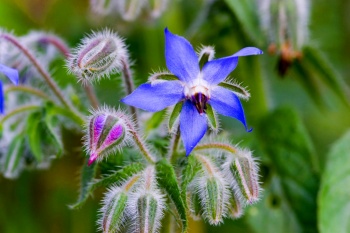Borage
From Wikiwel
Other Names: Bee Plant, Beebread, Borage Flower, Borage Leaf, Borage Oil, Borage Seed Oil, Borago, Borago officinalis, Borraja, Bourrache, Bourrache Commune, Burage, Burrage, Common Borage, Common Bugloss, Cool Tankard, Feuille de Bourrache, Fleur de Bourrache, Huile de Bourrache, Huile de Graines de Bourrache, Langue de Bœuf, Ox's Tongue, Pain-des-Abeilles, Talewort, Starflower, Starflower Oil.
Borage is a plant. Its flowers and leaves, as well as the oil from its seeds are used as medicine.
Special Precautions of Borage
- Borage seed oil is POSSIBLY SAFE for most adults and children as long as it is free of dangerous chemicals called pyrrolizidine alkaloids (PAs). Borage plant parts including the leaf, flower, and seed can contain PAs. PAs can damage the liver or cause cancer, especially when used in high doses or for a long time. Only use products that are certified and labeled PA-free.
- Pregnancy and breast-feeding: It’s important to avoid borage products that might contain pyrrolizidine alkaloids (PAs). PAs are a risk to the mother because they can cause serious liver disease and might cause cancer. PAs are also a risk to the infant because they might cause birth defects and they can pass into breast milk. Researchers aren’t even sure if borage products that are certified PA-free are safe during pregnancy and breast-feeding. It’s best to stay safe and avoid using borage.
- Bleeding disorders: There is some concern that borage seed oil might prolong bleeding time and increase the risk of bruising and bleeding. If you have a bleeding disorder, use borage with caution.
- Liver disease: Borage products containing hepatotoxic pyrrolizidine alkaloids (PA) might make liver disease worse.
- Surgery: Borage might increase the risk of bleeding during and after surgery. Stop taking borage at least 2 weeks before a scheduled surgery.
- Medications that increase the break down of other medications by the liver (Cytochrome P450 3A4 (CYP3A4) inducers) interacts with BORAGE
- Medications that slow blood clotting (Anticoagulant / Antiplatelet drugs) interacts with BORAGE
- Medications used during surgery (Anesthesia) interacts with BORAGE
Benefits and uses of Borage are
- Borage seed oil contains a fatty acid called gamma-linolenic acid (GLA). GLA seems to have anti-inflammatory effects. Borage flower might have an antioxidant effect.
- Diuretic. Borage is used to remove excess liquid from the body, and is believed to help remove toxins.
- Sudorific. Borage is known to contain choline that stimulates the glands that produce sweat and cools the body. Because of this cooling property of borage, it is used to treat fever, bronchitis, colds and flu.
- to treat arthritis. Borage is rich in essential fatty acids that help to relieve pain associated with arthritis.
- sedative action. Borage contains niacin or nicotinic-acid that may have positive effects against anxiety, stress and nervousness.
- Another disease that may be caused by lack of fatty acids is macular degeneration. Borage may also be used for the prevention and treatment of macular degeneration.
- being studied on its effect to breast cancer.
- Rich in omega-6 fatty acid that is found to have positive effect against breast tumor growth.
- Used in the treatment of prostate gland inflammation such as prostatitis.
- Promotes digestion and helps to relieve stomach aches such as gastritis and irritable bowel syndrome.
- Used to treat skin infections and inflammation such as dermatitis, eczema, psoriasis, pimples, herpes, nail fungus, etc.
- A poultice of crushed Borage leaves is also used to relieve insect bites and stings, reduce swelling and bruising and is also helpful for clearing up boils and rashes.
- Borage tea is also used to promote milk production for lactating mothers
- Borage is also used to treat hangover
